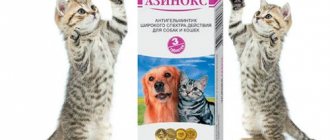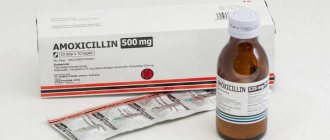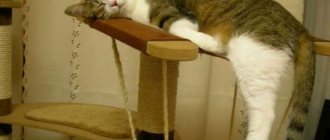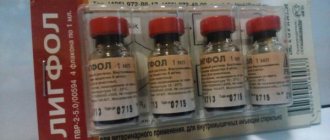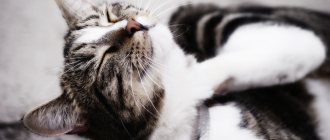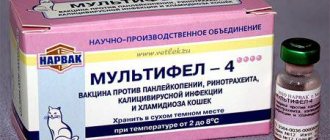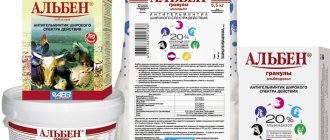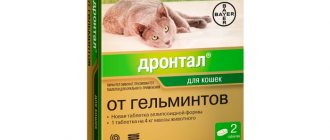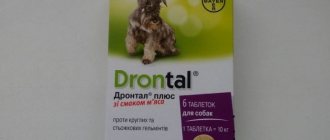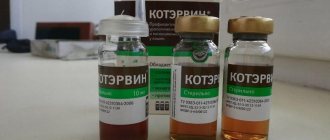Features of the action
When entering the body, the active substances are absorbed very quickly. After just four hours, the animal’s immunity increases significantly. The tablets have anti-inflammatory, anti-infective and anti-tumor effects. After using the drug, the cells will be saturated with oxygen, and lysosomal enzymes will begin to work, destroying a huge number of foreign bodies. At the same time, all the body’s immune processes are activated. Most of the breakdown products are excreted from the body through the kidneys.
How it works
The immunomodulator is of natural origin, as it contains a “cell wall” - a cell element that provides protection from external negative factors. The drug has the ability to increase immunity and smooth out the consequences of strong reactions. The drug also has the following effect:
- eliminates inflammatory processes by reducing the production of substances that are involved in them;
- destroys viruses, bacteria, fungi and other pathogenic microorganisms by increasing phagocytosis;
- stimulates tissue regeneration;
- removes or prevents the consequences of the negative effects of stressful situations;
- increases the overall resistance of the body;
- improves the effect of antitumor drugs;
- promotes the formation of immunity during vaccination.
A special feature of Glycopin is its mild effect on all parts of the immune system. The maximum concentration of the active substance in the animal’s blood occurs 4 hours after taking the medicine. The bioavailability of the drug is 77%. The medication is excreted from the body through urine and feces.
Glycopene is a low-hazard drug. It is not able to influence the development of the fetus and does not provoke the appearance of mutations. Does not contain toxic substances that can cause poisoning. It does not accumulate in the body, so it is not addictive.
Analogs of Glycopene
There are no analogues to the drug. All medications for dogs (82) All medications for cats (76) All medications for rodents (33)
Glycopene (GMDP) is a safe regulator of the immune system of pets. The drug is based on a structural component of the cell walls of almost all bacteria, including those that normally live in the intestines of vertebrates. Thus, Glycopene (GMDP) is not foreign to the body, since cell wall fragments constantly enter the bloodstream.
The drug Glycopin (GMDP) has the ability to enhance the body’s weakened immune response or smooth out the consequences of inappropriately strong reactions.
Glycopene (GMDP) is successfully used for the treatment and prevention of diseases of small domestic animals accompanied by immunodeficiency conditions, including acute and chronic inflammatory reactions of various origins.
The immunocorrector Glycopin (GMDP) has positively proven itself in the treatment and prevention of such diseases of small domestic animals as canine distemper, infectious hepatitis, parvovirus enteritis, demodicosis and sarcoptic mange of dogs, panleukopenia and infectious rhinotracheitis of cats, with acute and chronic inflammatory reactions, as well as systemic fungal diseases accompanied by profound immunosuppression.
In addition, positive results were obtained when using the drug to enhance and improve the quality of the immune response during vaccination.
INDICATIONS FOR USE:
- prevention and treatment of diseases of viral, bacterial and fungal etiology;
- prevention of primary and secondary immunodeficiencies, including immunodeficiencies in newborn animals;
- reduction of the involution period;
- correction of transport stress in dogs, cats and rodents, including when visiting exhibitions and grooming salons;
- correction of stress during all veterinary treatments (haircut, nail trimming) and various manipulations (chipping, vaccination);
- for rapid healing of postoperative, purulent-necrotic and long-healing wounds and trophic ulcers;
- treatment of oncological diseases in complex therapy during remission;
- before and after vaccination to enhance the production of antibodies, stimulate the increased immune status of the animal;
- when introducing an animal with an unknown epizootic status into a nursery, the use of the drug reduces the risk of infectious diseases both in the animal introduced into the nursery and in animals already kept in the nursery.
ADVANTAGES OF USING THE IMMUNOMODULATOR GLYCOPIN® IN STANDARD TREATMENT REGIMENS:
- Glycopene® increases the possibility of curing animals with weakened immune systems in which standard therapy does not work effectively;
- Glycopene® has a targeted effect in the treatment of viral, bacterial and fungal diseases of small domestic and exotic animals;
- Glycopene® has the unique ability to prevent and treat septic shock.
Glycopene (GMDP) has immunocorrective, anti-infective and anti-inflammatory effects.
The drug increases the overall resistance of the animal’s body to pathogenic factors, primarily by stimulating the functional activity of the main part of the immune system - monocytes and macrophages. The latter, through phagocytosis, destroy pathogenic microorganisms and, at the same time, stimulate the synthesis of natural immunity mediators - cytokines, which enhance the formation of antibodies. Thus, Glycopene (GMDP) affects all populations of immunocompetent cells.
Name GLYKOPIN Name (Latin) Glikopin Composition and release form Glykopin in 1 tablet contains 1 mg of N-acetylglucosaminyl-N-acetylmuramoyl-alanyl-D-isoglutamine (GMDP) as an active ingredient, as well as auxiliary components. Produced in the form of round, uncoated tablets, white in color, slightly sweetish taste, weighing 0.1 g. Packaged in 10 tablets in blisters made of aluminum foil and packed in cardboard boxes. Pharmacological properties GMDP, which is part of glycopin, is the main structural unit of peptidoglycan in the bacterial cell wall. Glycopene, by binding to a specific receptor NOD2, affects cells of the innate immune system. Causes stimulation of the effector functions of phagocytes (phagocytosis, synthesis of reactive oxygen species, activity of lysosomal enzymes) and the production of anti-inflammatory cytokines, which in turn induce proliferation, activation and differentiation of acquired immune cells - T- and B-lymphocytes. By enhancing the production of colony-stimulating factors, glycopin induces leukopoiesis. As a result of the action of the drug, all parts of the immune system are activated with an increase in anti-infective and anti-tumor immunity. After oral administration, glycopin is quickly absorbed into the blood. The half-life of the drug in the body is 4 hours. It is excreted from the body mainly through urine. In terms of the degree of impact on the body of warm-blooded animals, glycopin is a low-hazard substance and does not have a teratogenic, mutagenic, locally irritating or sensitizing effect. Indications Prescribed to dogs and cats for the prevention and treatment of infectious diseases of bacterial and viral etiology. To increase the general resistance of pregnant dogs and cats, as well as puppies, kittens and old animals. Strengthening the effectiveness of vaccination in weakened animals with secondary immunodeficiency, as well as reducing post-vaccination complications. Relieving stress in animals during transportation and various veterinary treatments. To stimulate the processes of repair and tissue regeneration after injuries and surgical interventions. Prevention of immunopathology in the offspring of pregnant females, as well as shortening the period of involutional postpartum processes in the uterus. Doses and method of administration Glycopene is administered orally to dogs and cats. For the prevention and treatment of infectious diseases of bacterial and viral etiology, glycopin is given in a dose of 0.04 - 0.06 mg per 1 kg of animal weight once a day for 5 - 7 days, depending on the severity of the disease (for dogs weighing up to 10 kg - 0.5 - 1 tablet, more than 10 kg - 1 - 2 tablets, cats weighing up to 3 kg - 0.25 - 0.5 tablets, more than 3 kg - 0.5 - 1 tablet). To enhance the effectiveness of vaccination in weakened animals with secondary immunodeficiency, increase general resistance and prevent post-vaccination complications, as well as stimulate the processes of repair and tissue regeneration after injuries and surgical interventions - at a dose of 0.02 - 0.04 mg per 1 kg of animal weight once or twice with an interval of 24 hours (dogs weighing up to 10 kg - 0.25 - 0.5 tablets, more than 10 kg - 1 - 1.5 tablets, cats weighing up to 3 kg - 0.25 tablets, more than 3 kg - 0.5 pills). To prevent a decrease in immunity during stressful conditions, to prevent immunopathology in the offspring of pregnant females, as well as to shorten the period of involutional postpartum processes in the uterus - in a dose of 0.01 - 0.02 mg per 1 kg of animal weight once or twice with an interval of 24 hours (for dogs - 0.5 - 1 tablet, cats - 0.25 - 0.5 tablets). Side effects Hypersensitive animals may experience allergic reactions. In some cases, when using glycopin, a slight increase in temperature is possible, associated with the therapeutic effect of the drug. The increase in temperature is short-lived and goes away on its own. Contraindications Increased individual sensitivity to the drug. Glycopene is not recommended for use simultaneously with high doses of glucocorticosteroid drugs. Special instructions Treatment with glycopin does not exclude the use of antibiotics and other symptomatic medications. Especially in seriously ill animals and with individual hypersensitivity to drugs. Storage conditions: In a dry place, protected from light and out of reach of children and animals, at a temperature of 0 to 25 °C. Shelf life: 5 years. Manufacturer Peptek CJSC, Russia
Address: 117997,
Moscow, st. Miklouho-Maklaya, 16/10, IBCh RAS. Tel./fax, 429-77-40, 429-80-10
More about the manufacturer
Indications for use of Glycopene
Glycopene is indicated in the following cases:
- in complex therapy and prevention of infections of bacterial and viral etiology, cancer;
- to increase the nonspecific resistance of the organism of young and old animals;
- to enhance the effectiveness of vaccination in weakened animals with secondary immunodeficiency;
- to relieve stress during transportation and veterinary treatments;
- to stimulate tissue repair and regeneration processes after injuries and surgical interventions;
- as a prevention of immunodeficiency in kittens and shortening the period of postpartum processes in the uterus.
Mechanism of action of the immunomodulator
The active ingredient of the immunomodulator is similar to a fragment of a bacterial cell; it activates the work of T- and B-lymphocytes. The induced activity of lymphocytes increases the body's resistance to pathogenic factors. The animal's immunity becomes resistant to infections and tumor formations. Glycopene is absorbed into the blood through the intestinal walls, and the maximum concentration of the drug in the blood occurs after 4 hours. The drug is excreted partially naturally.
In what cases is the drug prescribed?
“Glycopene” for cats, reviews of which are mostly positive, is prescribed primarily to eliminate immunodeficiency. The drug also works well in case of severe poisoning of an animal, as it increases the body’s resistance to dangerous infections.
Veterinarians recommend using the drug “Glykopin” for cats, reviews of which are described in this article, in the following cases:
Indications for use
The medication is used for the treatment and prevention of diseases of viral and bacterial etiology. The medicine is prescribed for severe immunodeficiency in sick and weakened cats during the postoperative period. Tablets are used to reduce the risk of post-vaccination complications. The drug can be prescribed to stimulate wound healing after injury, burns and other types of damage. The medication is indicated after birth to speed up the recovery of the cat’s body.
The medicine helps eliminate the effects of stress in a cat after diagnostic measures, as well as after adding another pet or moving to a new territory.
When can you use Glycopin?
According to the instructions, the immunostimulant is used in the treatment and prevention of diseases of infectious and bacterial origin, secondary immunodeficiency conditions;
Glycopene helps animals restore their bodies after difficult births, reducing the likelihood of developing endometritis and pyometra;
The effectiveness of the drug has been proven in the treatment of diseases of the gastrointestinal tract of infectious origin in puppies and kittens.
The drug is used to reduce the effects of stressful situations caused by participation in exhibitions and sports competitions and transportation. It is recommended to use Glycopin before vaccination or visiting a veterinarian.
The medicine is used to reduce the healing time of wounds, postoperative sutures, dermatitis, and ulcerative lesions.
Glycopene is used as maintenance therapy for cancer, especially during remission.
The drug is used for dogs and cats that were taken from shelters and kennels where there were cases of animal disease.
Glycopene is used for such serious conditions as sepsis, cancer, life.
The drug is used for pregnant cats and dogs in order to correct the immunity of future offspring.
A few words about the purpose
Cats living in private areas are more susceptible to diseases. Their immunity is more weakened due to bad weather conditions, as well as cold and rainy weather. "Glycopin" - tablets for cats and dogs, which are an excellent way to combat seasonal colds in your pets.
The drug will also come to the aid of wounded animals. Damaged areas will begin to heal and scar faster. At the same time, you will notice how your pet's coat improves. It will become smooth and shiny, all fungal diseases will disappear. Experts recommend giving the animal the product before mating. This increases the chances of having healthy kittens and puppies.
Composition and release form
The dosage form is white tablets of white color and small size. There is a notch for convenient division if necessary. Packed in blisters of 10 pieces. One blister and instructions for use are placed in a cardboard package.
The active component is glucosaminylmuramyl dipeptide (GMDP). A substance is a substance obtained as a result of chemical synthesis. It is an analogue of natural peptidiglycan, which is a “cell wall” - a kind of barrier or protective framework of the cell.
The following are used as auxiliary components:
- lactose monohydrate;
- calcium stearate;
- potato starch;
- sucrose;
- methylcellulose.
Composition and expiration date
The drug is produced in white tablets. Each contains 1 mg of active substance (HMDP) and additional components for the formation of the dosage form (starch, calcium stearate, sucrose, etc.).
Tablets are packaged in plastic cells of 10 pcs. and packed in cardboard boxes. They can be stored in this form for 5 years . Storage conditions:
- temperature 0…+25°C;
- dry place;
- no direct sunlight.
Store the medicine out of the reach of children and animals.
The drug must be used strictly according to the instructions or prescriptions of the veterinarian .
Choosing the right dosage
The drug Glikopin, a description of which you can read in this article, must be used in the correct dosage. Its effectiveness and safety depend on this.
The dosage is determined in accordance with the weight of the animal, as well as the main purpose of use. For small kittens weighing up to two kilograms, a fourth of the tablet will be enough for treatment, and an eighth for prevention. For cats up to three kilograms, a dosage of a quarter to half a pill is suitable. And adult cats weighing more than three kilograms are usually given a whole tablet or half of it.
For treatment to be effective, the animal must take the medicine once a day for a week. In some cases, the period may be increased or, conversely, reduced. An experienced veterinarian will tell you all the details of the treatment.
Contraindications and side effects
The instructions indicate that Glycopin has no contraindications and can be used for cats of different breeds. An exception is individual intolerance to the components, which is manifested by allergic reactions of the body, but it is rare. The drug is approved for use by newborn kittens, old pets with a set of chronic diseases, weakened and exhausted animals.
Important! Glycopene is considered a safe medicine, but it should only be used on pregnant cats under the supervision of a veterinarian.
The immunostimulant can be used in conjunction with antibacterial agents, anesthetics and other drugs for symptomatic treatment. Combines with different types of feed from domestic and foreign manufacturers. It is not recommended to use Glycopene simultaneously with large doses of glucocorticosteroids.
Usually the drug is well tolerated by animals of different breeds and ages and does not cause side effects. In rare cases, a short-term increase in body temperature may occur. In this case, no special measures are required. No side effects have been identified in case of overdose.
Contraindications and precautions
The drug is well tolerated by cats of different breeds and age categories. Glycopene is recognized as a non-toxic drug, so there are no absolute contraindications to its use. However, if there is a high individual sensitivity to the components that make up the drug, its use is prohibited. Temporary contraindications include pregnancy and lactation (can be taken only with the permission of a veterinarian). Also, caution should be taken when taking Glycopene simultaneously with glucocorticosteroid drugs (especially at high dosages). Simultaneous use of antibacterial and symptomatic agents is permitted. Side effects, as a rule, do not appear. In rare cases, an overdose may cause an increase in body temperature and problems with the gastrointestinal tract. If the drug enters the human body, it is recommended to drink 0.5 liters of warm water. If your condition worsens, it is important to contact a medical facility in a timely manner.
Reviews
Not only owners of adult cats, but also owners of small kittens pay attention to Glykopin. Many people take the advice of veterinarians and use these tablets as a preventative measure. After using it, even cats who spend a lot of time outside do not become infected with infectious diseases and colds.
On the Internet you can find many positive reviews about the product used to treat furry pets. Pet owners report that their pets get stronger very quickly, they gain vitality, their appetite improves, their bowel movements become normal, and the disease goes away. However, some cat owners also noticed undesirable effects after using the drug, which manifested themselves in the form of vomiting and diarrhea.
Owner reviews
Vera, owner of a 7-month-old kitten:
“We used Glykopin for a kitten in complex therapy for mycoplasmosis. I cannot say with certainty that the rapid recovery is the merit of this medicine, since other medications were also taken, but during the year the cat did not suffer from infectious or other diseases. The tablets do not have a bitter taste, so there were no difficulties with use.”
Evgeniya, owner of a Thai cat:
“When a cat was diagnosed with rhinotracheitis (at that time she had small kittens), Glycopin was given for 10 days. We were very worried about the kids, since the infection is dangerous for them. The cat ate the tablets with food without any problems. We managed to avoid the sad consequences, but I noticed a side effect - decreased appetite. Nyura began to eat little, but after completing the course, her appetite returned.”
How to use the medicine
The tablets are given to cats before meals, either whole or in crushed form. In the second case, the drug can be mixed with a small amount of water and poured into the pet’s mouth using a syringe without a needle. Pets weighing up to 3 kg - 0.25-0.5 tablets, over 3 kg - 0.5-1 tablets. The course of treatment ranges from 5 to 7 days. The exact amount of the drug and duration of therapy are determined only by the doctor.
The tablet can be given forcibly before meals
Tablets "Glycopin": reviews from doctors
Very often, veterinarians recommend the use of the drug “Glykopin” to pet owners. The product is truly very effective, proven and reliable. It is recommended to give these tablets to kittens found on the street, as well as domestic cats for preventive purposes. Many cases have been described in which the drug “Glycopin” saved the lives of animals. Being a very effective immunomodulator, it significantly increases the body's defenses, so the healing process proceeds much faster.
Veterinarians advise pet owners to use this remedy after surgery. The active components of the medication will contribute to the rapid recovery of your pet. If you care about the health of a kitten or an adult cat, do not pass by these tablets. With their help you will have a strong, cheerful and happy animal. Do not start diseases, it is better to take preventive measures. Every veterinarian will tell you that any disease is easier to prevent than to treat.
Instructions for use
Glycopene is used to treat cats of any age. The drug has a number of pharmacological effects: anti-inflammatory, antitumor, anti-infective. The specificity of the drug is its mild effect on all parts of the immune system. Glycopene's instructions for cats are simple: the drug is given orally. Due to the sweeteners included in the composition, pets can consume the tablets without any problems. Veterinarians recommend giving the tablets during (or before) meals. Skipping doses can reduce the therapeutic effect. The duration of treatment is determined by the veterinarian, but it should not exceed 10 days.
.
The principle of action of the medicine
The principle of action is based on the ability to sharply increase phagocytosis, increase the activity of lysosomes of all protective cells of the body. Simply put, the use of the medicine leads to increased activity of the cat’s immune system, which begins to identify and destroy infectious agents and cancer cells much faster. It is especially important that the production and training of T- and B-lymphocytes is accelerated. In general, it is the latter that are responsible for specific immunity and the ability to resist infectious diseases (and not only).
After administration, the maximum concentration of the drug components in the blood plasma and other biological fluids is reached after approximately four hours. The degree of assimilation is at least 76%. About 32% of the medicine is excreted in urine and feces after a couple of days, the rest is completely absorbed by the body immediately. The drug has no irritating, toxic or teratogenic effects; it can be used to treat animals of all ages, breeds, and any gender. During the entire clinical trial, no side effects were reported, and no cases of overdose were identified.
Special instructions and personal preventive measures
Treatment with Glycopin® does not exclude the use of antibacterial drugs.
Glycopene® is not recommended for use simultaneously with glucocorticosteroid drugs in high doses.
Glycopene® can be used in conjunction with feed.
No cases of incompatibility of the drug with other drugs and feed have been identified.
Pregnancy and lactation are not a contraindication for the use of the drug, however, Glycopin® should be used in pregnant animals under the supervision of a veterinarian.
It is possible to use the drug in the offspring of animals, starting from the first days of life.
Glycopene® is not intended for use in food producing animals.
Personal prevention measures
When using the drug Glykopin®, you should follow the general rules of personal hygiene and safety precautions provided for when working with medications. After handling the drug, you should wash your hands with soap.
If the drug accidentally gets into the human body, you should drink several glasses of warm water, and if necessary, go to a medical facility, having with you the cardboard packaging or instructions for using the drug. Antidotes to the drug are not required.
Veterinarian's view
Veterinarians often advise pet owners to use Glycopin tablets. The medicine is indeed quite effective and proven, you can rely on it. It is advisable to give this medicine to kittens rescued from the street. It is also suitable for domestic cats to prevent all kinds of diseases.
Veterinarians recommend that owners of domestic cats use this medicine after undergoing surgery. The active substances of the tablets ensure a speedy recovery of animals. If a person is really worried about the well-being of a kitten or mature cat, he should not ignore this drug.
Veterinarians recommend this drug.
Kirill. Glycopin has helped many pet owners who come to me with complex cat diseases. This is how a cat who suffered bronchosepticosis, as well as a young cat after long-term treatment for opisthorchiasis, managed to quickly recover. For pets with cancer, it is also rational to prescribe an immunomodulator, which sometimes helps defeat this insidious disease.
Boris. Glycopene is one of the effective solutions that increases the animal’s defenses. I almost always recommend this remedy for infectious diseases, especially if I am asked to choose a cheaper remedy. Glycopene is made by us, so it has a favorable price tag, and there is practically no difference in the effect.
What kind of drug
"Glycopene" belongs to a group of drugs called immunocorrectors. Such medications are intended to activate and strengthen the body’s protective functions, that is, strengthen the immune system.
The drug contains a unique substance of its kind - parts of symbiotic organisms, in particular the membranes of their cells. The use of such a substance stimulates enhanced formation of immunity in the cat’s body.
“Glycopene” is considered extremely useful for immunodeficiency diseases in domestic animals, as well as for the treatment of viral diseases of various etiologies. In some cases, the medicine is used to prevent infection.
Description of the drug Glykopin for cats
Glycopene for cats is an immunocorrective drug. Available in the form of tablets and powder for the preparation of solutions. Glycopene is an excellent tool for strengthening the immune system of animals. It is used both as prevention and in complex treatment. Used by cats in tablet form. Sold in packs of 10 tablets.
Active substances
N-acetylglucosaminyl-N-acetylmuramoyl-alanyl-D-isoglutamine (GMDP) is the main active ingredient of the drug. One tablet contains 1 mg. Has a direct effect on the cat's immune cells.
The drug has several forms of use. It is given to cats in tablet form. Injections are given mostly to dogs. The tablets are administered orally to animals with their usual food or on their own. The maximum concentration is reached after 4 hours. It is excreted in the urine 12 hours after administration.
- Infectious, viral and fungal diseases;
- stressful situations;
- prevention of post-vaccination complications;
- complex treatment of oncology;
- the need to increase the overall resistance of the body;
- treatment and prevention of septic shock;
- primary and secondary immunodeficiencies;
- the need for tissue restoration after operations or wounds.
The drug is safe for pregnant cats. Moreover, its use is the prevention of immunopathology in offspring.
The dose is calculated on the basis that a cat weighing up to 3 kg is given 0.5-1 tablet per day, and animals larger than 3 kg are given 1-2 tablets per day. The course is prescribed by a veterinarian. Its approximate duration is from 5 to 7 days. That is, about 0.10-0.15 mg of the drug falls per 1 kg of weight.
To prevent infectious diseases or to strengthen the immune system, a dose of 0.05-0.08 mg is prescribed per 1 kg of cat weight. This is about a quarter to a half tablet for a cat under 3kg and a half to a whole tablet for larger animals per day.
For stress, cats are given a dose of a quarter to a half tablet per day, that is, about 0.03-0.05 mg per kg of animal weight.
general description
Glycopene is produced in the form of white tablets with a small diameter. Each tablet has a dividing chamfer in the middle. It simplifies the division into parts, which is especially important for cat owners. The tablets are packaged in blister packs of 10 pieces.
The main active substance is glucosaminylmuramyl dipeptide (GMDP), which is a minimal fragment of peptidoglycan from the bacterial cell wall. The composition also includes components that perform an auxiliary function:
- potato starch;
- calcium stearate;
- lactose monohydrate;
- methylcellulose;
- sucrose.
The medicine should be stored at positive temperatures no higher than 25˚C away from sunlight, which can destroy the active substance.
Storage conditions
Glycopene is stored in a dry place, out of reach of children and protected from direct sunlight. Storage temperature – from 0 to 25°C (can be kept in the refrigerator). If the appearance of Glycopin tablets differs from the description (for example, the color does not match), then in order to avoid negative consequences, it is not recommended to use it. Shelf life from the date of manufacture is 5 years. In a situation where the drug expires, it must be disposed of. Since it is non-toxic, no special precautions are required during disposal.
Directions for use and dosage
The medicine is used orally (powder or tablets) and administered intramuscularly. You can give it before or after feeding, as well as directly while the animal is eating. To simplify this process, it is better to crush the tablet to a powder state, then mix it with a small volume of water and pour (using a syringe) under the root of the animal’s tongue.
If the cat weighs no more than three kilograms, then it can be prescribed ¼-½ pills. Frequency of application – once a day. The duration of treatment should not be less than one week.
If the animal’s weight exceeds three kilograms, it is given half a tablet or a whole pill per use (at the discretion of the treating veterinarian). The frequency and duration of application are the same as in the previous case.
If it is necessary to prevent the development of an infectious disease, or we are talking about a period of remission of oncology, the dosage is slightly different. At the same time, per kilogram of live weight of the pet there is already 0.02-0.04 mg of the active substance. You need to administer the medicine once or twice, and the interval between doses is exactly 24 hours. For one animal there is:
- When the cat's weight does not exceed three kilograms, he is given ¼ tablet once.
- In cases where the animal is more than three kilos, ½ pill is prescribed.
Dose according to weight
The required dose of glycopin tablets is calculated depending on the pet’s body weight:
- if your cat weighs less than 3 kg, then she should be given 1/3 of the tablet;
- if your cat weighs from 3 to 6 kg, then she should be given half a tablet;
- if the cat’s body weight exceeds 6 kg, then she needs to be given a whole tablet at one time.
Typically, cats are given glycopin tablets 2 times a day, the duration of treatment will depend on the indication for use. Therefore, before treating your furry, you need to consult a specialist.
